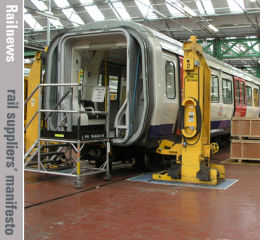Posted 13th November 2019 | No Comments
Next government will be urged to commit to railway improvements

THE Railway Industry Association has unveiled its own manifesto, with less than a month to go before the General Election.
The suppliers’ trade group has set out the main tasks which face the industry over the next 30 years, with the aim of developing a ‘long-term, sustainable rail industry’.
RIA is calling on political parties to contribute to these tasks, by developing a long-term strategy that promotes private investment, achieves a ‘better balance’ in the train fleet between new and refurbished rolling stock, helping to decarbonise the railway by increasing electrification and introducing alternative sources of traction, such as hydrogen fuel cells, and pressing ahead with the development of digital signalling.
It also wants a commitment to other major projects as well as electrification including HS2, Northern Powerhouse and East West Rail.
RIA says future governments must work with the rail industry to set the priorities and consider the role of the industry as a key exporter, when developing new trade agreements.
Chief executive Darren Caplan said: ’As the UK heads to the polls on 12 December, transport, and in particular, the future of rail, is one of the issues the political parties need to consider if they want to build a country with a world-class economy and best in class connectivity.
‘RAIL 2050 – the Railway Industry Association’s Manifesto – has been developed with the input of our rail supplier members, to set out our vision for a long-term, sustainable, rail network that works for customers, taxpayers and the wider economy. Our call to the next Government, whatever its political hue, is clear: we need a strategy not just for the next electoral cycle but for the next 30 years, which ends ‘boom and bust’ in rail funding, balances the train fleet with both new and upgraded trains, and which digitalises, decarbonises and delivers the range of major projects we need to increase capacity. This strategy also needs to help promote greater innovation and collaboration in the sector, whilst developing rail as a key part of the UK’s exports and overseas trade offer.
‘Whilst we look forward to seeing each of the political parties’ manifestos as they are published, all of us in the railway industry need to make the case for building world-class rail at home and abroad both before and then when a new Government is finally elected. With the Williams and Oakervee Reviews reporting soon too, and Brexit continuing the uncertainty, now really is a crucial time in the development of rail policy for the years ahead.’
